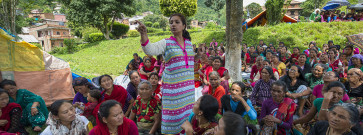Philanthropic Contest Winner Would Have Embarrassed Self and Foundation but Shame Proves Elusive
Published on: September 23, 2015

There are sometimes reasons why foundations are seen as out of touch with reality, and at least one of those reasons is a failure to admit when you have not only made a mistake, but a big mistake—and in public. Not admitting it, of course, creates the omerta that we all suffer from, the refusal to name the nakedness of the emperor, but in this case the naming has been done for us.
It all began two years ago when the St. Paul Foundation decided to dabble in contest philanthropy with the “Forever St. Paul Challenge,” which was established to find the best idea to improve the city. The choice would be made by popular vote at the state fair. The foundation would then award $1 million to a local nonprofit for implementation. Reportedly, this attracted 1,000 entries, with proposals for everything from a treehouse-hotel (which sounds great to me) to a floating museum, to the world’s largest model railroad. But the project that won was for a local-food center to be sited in an abandoned four-story warehouse. The plan was to include a cafe, a food truck, a catering center, classrooms, and a processing center for local farmers.
Two years later, after the idea proved entirely unfeasible, the warehouse has been demolished, and $825,000 has been spent on classes, community building programs and staffing costs, Tracy Sides, who thought the idea up, is still enthusiastic. “The core of the idea is that food is magic,” Sides said, “and we want to bring that magic to the East Side.”
Others are less bubbly about the fiasco. Craig Blakely, who admittedly was one of three finalists in the contest and therefore used to have a dog in the fight, said the project won because it was really a $6 million project and the program is nothing if not redundant with others. This article states, “The Mississippi Market co-op six blocks from the Urban Oasis kitchen offers classes about local food. Farmers’ markets are booming, and dozens of restaurants, co-ops, schools and stores sponsor similar classes.” And Blakeley may be understating the financial absurdity of the situation, since a cost estimate to fix up the building really came to a cool $9 million.
Sides has since launched Kitchen on the Bluff, producing condiments for sale at St. Paul Saints baseball games and hosting classes and community meals.
About the warehouse or lack thereof, she comments, “The fact is that the shell is gone,” Sides said. “But the essence is still there.” Essence—just what we all need!
“That’s the magic of food—it’s connected to everything,” Sides said.
“The nice thing about saying you are building community is you can’t see it. You can’t measure it. There is no accountability,” said Blakely. “Ask them to show you the community they have created, and you will get a couple of jars of salsa.”
A little due diligence likely could have gone a long way, and it hurts to think about the uses that the million dollars could have been put to by an organization with a challenge in front of it and track record behind it. But does the St. Paul Foundation have a mea culpa or two for its community and grantees? Not at all. In fact, Ann Mulholland, vice president of grants and programs, said, “I believe this is a wild success. When you have a vision, you can have bumps in the road, but then you transition your vision.”—Ruth McCambridge
Story From: St. Paul Pioneer Press






